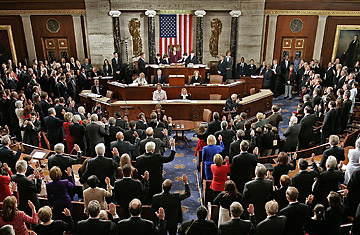
Cabinet appointments and plum White House staff picks grab headlines during a transition. But the fate of the Obama presidency will be shaped just as much — if not more — by the messy behind-the-scenes process already under way in Washington: the reorganization of power on Capitol Hill. Three key elements to that process are still being sorted out: the final party-line composition of the Senate; the new GOP leadership in the House and how it reflects the new Republican mission and message; and the ability of House and Senate Democratic leaders to control crusading members who read Obama's win as a green light for a revolution. (Read "Who Will Be Obama's Pick for Treasury Secretary?")
Like all candidates, Obama made a lot of promises during the campaign. High on his agenda are ambitious proposals for subsidies and tax breaks to develop new energy sources like biofuels, a sweeping health-care plan, and shifting the tax burden toward those higher on the income scale. By Wednesday congressional power players were already planning the path forward in anticipation of these initiatives. House Republicans are gaming leadership changes, and among top Democrats, there's an urgency to raise their dismal approval ratings by delivering for Obama. "Given the [Democratic] majorities in both bodies, it'll be incumbent on everyone here to get things done," says Jim Manley, the spokesman for Senate Majority Leader, Harry Reid. (See behind-the-scenes pictures of Barack Obama's campaign.)
First, the makeup of the Senate needs to be determined. That could drag out. As of now, the Democrats have 56 seats. A 57th is possible if Oregon Democrat Jeff Merkeley's apparent slim victory of a few thousand votes holds up against any procedural challenge incumbent Gordon Smith throws against him. And the Democrats could conceivably pick up more. Republican Saxby Chambliss, though he won a plurality of votes on Tuesday, faces a runoff in Georgia on Dec. 2. In Minnesota, the recount of the nearly tied Senate race will go into December at least, to determine whether Al Franken unseats GOP incumbent Norm Coleman. And counting continues in the tight Alaska race. Even if incumbent Ted Stevens retains his seat, Senate GOP leader Mitch McConnell has said there will be a vote to oust the recently convicted Senator. That would prompt a required special election 60 to 90 days later and could mean another possible gain for Dems there as late as next spring.
The difference between 56 and 58 and 60 seats is important. The fewer Democrats Reid needs to hold and the fewer Republicans he needs to win over, the easier it will be to deliver for Obama. There are several blue-state Republican Senators to provide Reid a target for alliances: Susan Collins and Olympia Snowe in Maine, Arlen Specter of Pennsylvania and George Voinovich in Ohio have all broken from their party at points. At least publicly, McConnell is promising cooperation. In a statement on Wednesday, he said, "These times are too important not to move quickly together."
A lot will also depend on what happens in the Republican House. As the Republican Party searches its collective soul following its debilitating loss, much of its message will be shaped by who wins leadership in the House. But will conservatives or moderates or both lead the charge? "No matter who's in leadership we're going to have to become the reform party again," says Paul Ryan, a young conservative from Wisconsin.
As it stands, moderates and conservatives alike predict that Ohio Republican John Boehner is likely to stay in charge on the strength of his handling of the bailout rebellion in September and the drilling fight over the summer. Majority leader Roy Blunt, long the object of complaint among party foot soldiers, announced Thursday that he would step down, a day after the party's No. 3, Adam Putnam, did the same.
Young pragmatists like Ryan and Mark Kirk, who heads the moderate Tuesday Group, appear to be looking for an issue-by-issue approach — rather than a grand ideological transformation of the party — to manage the surge of Obama power that is preparing to hit Congress next January. They'll offer a deal on energy — most likely permitting more offshore drilling in exchange for various incentives for green energy — but resist tax hikes, a change in union voting rules or other measures that are opposed by small business.
Perhaps the biggest determinant of how Obama's agenda will fare in coming months will be whether Nancy Pelosi and Harry Reid can control their respective members. Liberals want Obama to pursue tax hikes on the rich and tax cuts for everyone else as soon as possible; centrist Southern Blue Dogs want him to tackle entitlement reform. Resolving the competing agendas will be tricky.
In the Senate, wary of Obama's ability to overcome a GOP filibuster or control independent-minded Democrats, Reid wants to pursue a "baby step" approach first. But one Reid aide says it's not yet clear whether Obama will want to go with a big-agenda item early. "There's two options: hit for the home run, or pick off low-hanging fruit."
Even before the shape of the new Congress is known and strategies on those issues can be settled on, there will be a test for Obama: the House is expected to tackle a stimulus bill proposed by Democrats when the outgoing Congress returns for a lame-duck session on Nov. 17. Senate Democratic aides say they expect the GOP to filibuster it even if it makes it out of the House.
